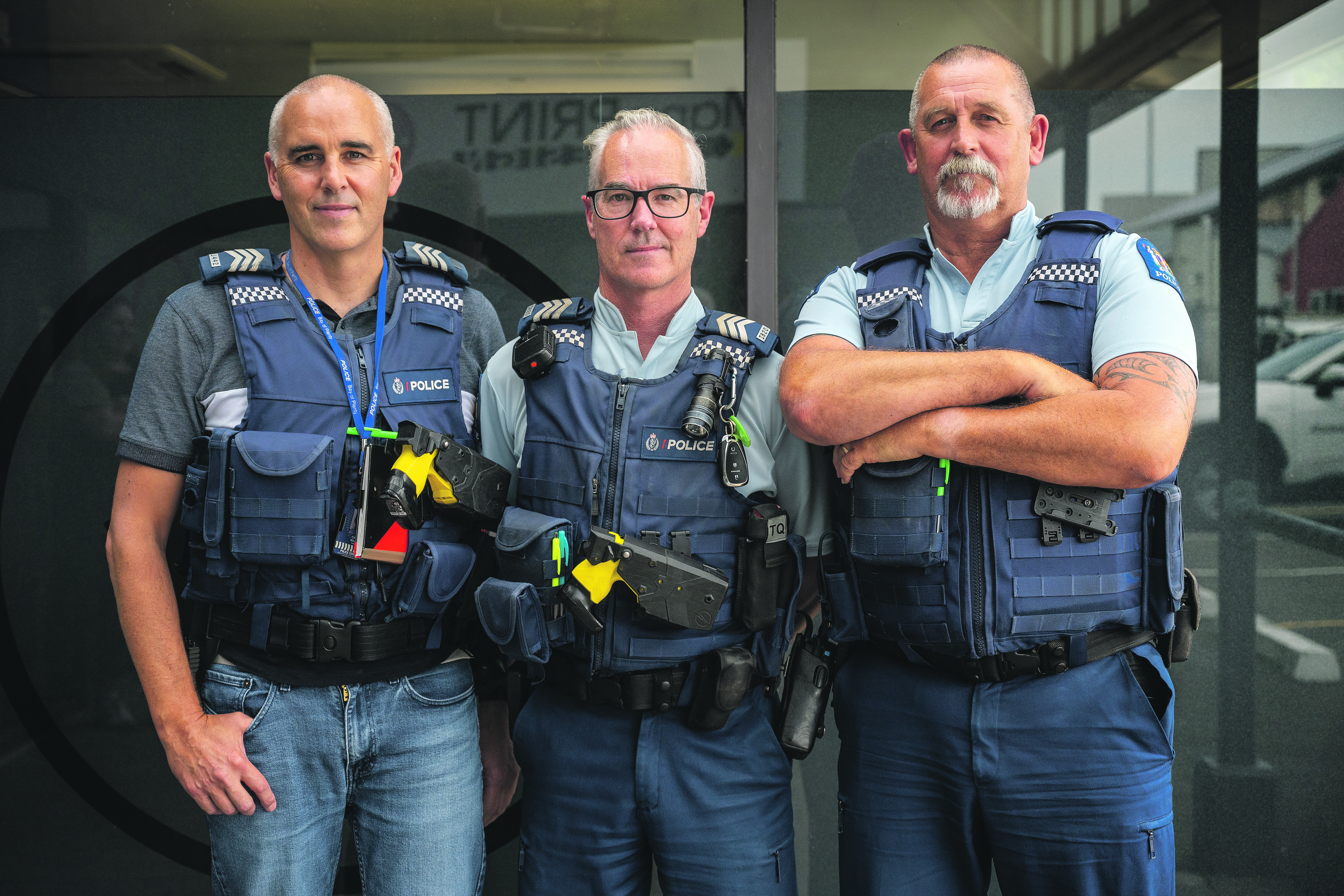Police recognised for Whakaari response

RECOGNITION: Sergeant Caoin Macey, Sergeant Chris Howard and Senior Constable Kevin Raynes were among the police staff who have received merit awards for their actions in response to the eruption of Whakaari/White Island. Photo Troy Baker E5134-09
Brianna Stewart
The members of Bay of Plenty police who banded together in response to the eruption of Whakaari have been recognised on the fifth anniversary for their actions.
Despite their assertions they were just doing their jobs, three of the Whakatāne officers who received bronze merit awards say Monday’s ceremony was a nice moment to share with their families, some of the victims, and the upwards of 20 other police staff who received awards for their role in the response.
Police Commissioner Richard Chambers presented the merit awards, which recognise bravery and exemplary performance by police of their duties across three levels of awards and one commendation.
Whakatāne Sergeant Chris Howard said the ceremony was a sombre experience that provided police with an opportunity to reconnect with the victims and their families.
He said although police could encounter horrific scenes at car crashes or homicides, the day Whakaari erupted was different.
Mr Howard was one of the police staff who found himself on the first of two boats to arrive back at the wharf with casualties, starting the triage process to help the injured receive the care they required.
From his position on the back of the boat with two severely injured women he was certain would not survive, he saw firsthand the power of the human spirit and will to live.
“I met one of the ladies again last year. It wasn’t closure for me, but it was good for my mental health.
“She had told me things that she wanted me to share with her husband and kids – and I didn’t have to.”
On the boat with Mr Howard was Sergeant Caoin Macey, who ran the response operation.
He said when Whakaari erupted, police had no idea if anyone was on the island but once they learned the extent of the situation, they had about 20 minutes to organise themselves to receive the victims.
The scene at the wharf was indescribable, but saying it was like a war zone would likely come close.
Police were triaging people for injuries, trying to identify who was on the first boat, get people off it, manage their possessions and direct them to the appropriate care.
“If you can imagine us trying to organise all of that, in the middle of a war zone, then another boat arrives, helicopters are flying in and out; you can’t really describe it.
“Everything was covered in volcanic ash, and it smelled like strong sulphur, it was gritty, and the injuries were indescribable.”
Mr Macey said from the police perspective, acknowledgement had to go to the victims and their families first, but also to Ngāti Awa.
“The amount of aroha and awhi that they showed was off the charts.”
He said the response to the eruption was a major team effort that would not have been possible with just one or two staff.
“As a collective team, we achieved a good result.
“I was proud to be a member of the Eastern Bay police when I saw how everyone came together.”
As victims were brought off the boat, they were received by people such as Senior Constable Kevin Raynes, who would take them to the fire brigade and in turn, paramedics.
Mr Raynes said roles were not assigned to specific staff on the ground. Rather, they folded naturally into them.
He knew the firefighters and ambulance crews from previous events, so he took up liaising with them and setting up a staging area for people who came off the boat.
“We couldn’t stand there and assess anything; we had to act right away.
“I didn’t actually see what was in front of me. I just acted the way I knew to.”
Mr Raynes said police who responded to the situation came from different areas within police – for example, he is part of the youth aid team – but all the departments pulled together to do what they needed to do.
He said the scene was confronting, and he was concerned for junior police staff who were thrown into identifying victims and transporting them from the boat.
Mr Raynes vividly remembers transferring a married couple from the boat to the wharf.
The husband insisted his wife go on a stretcher, and he would walk off the boat.
She survived. He didn’t.
“The stuff we saw and dealt with hit us afterwards. This is why a debrief is really important to our staff, especially the young ones.”
The Whakaari eruption had a lasting emotional effect on many police who responded to the tragedy, with some still unable to talk in detail about what they saw that day.
While they think the focus should remain on the victims, many appreciated receiving their brooches bearing a laureate bar as recognition for their part in the response.
An entire investigations team was also assigned in the aftermath.
They are five years of work in and counting, as cases have gone through the courts, trials, appeals and, soon the coroner’s court.
RECOGNITION: Sergeant Caoin Macey, Sergeant Chris Howard and Senior Constable Kevin Raynes were among the police staff who have received merit awards for their actions in response to the eruption of Whakaari/White Island. Photo Troy Baker E5134-09